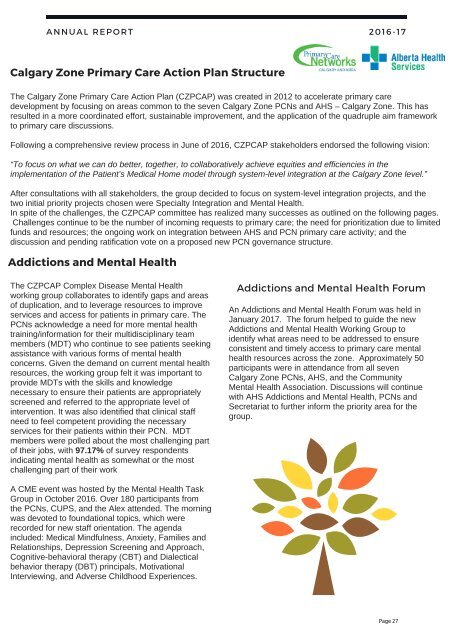DFM 2016-2017 Annual Report
2016-2017 Annual Report from the Department of Family Medicine, Calgary.
2016-2017 Annual Report from the Department of Family Medicine, Calgary.
- No tags were found...
Create successful ePaper yourself
Turn your PDF publications into a flip-book with our unique Google optimized e-Paper software.
A N N U A L R E P O R T 2 0 1 6 - 1 7<br />
Calgary Zone Primary Care Action Plan Structure<br />
The Calgary Zone Primary Care Action Plan (CZPCAP) was created in 2012 to accelerate primary care<br />
development by focusing on areas common to the seven Calgary Zone PCNs and AHS – Calgary Zone. This has<br />
resulted in a more coordinated effort, sustainable improvement, and the application of the quadruple aim framework<br />
to primary care discussions.<br />
Following a comprehensive review process in June of <strong>2016</strong>, CZPCAP stakeholders endorsed the following vision:<br />
“To focus on what we can do better, together, to collaboratively achieve equities and efficiencies in the<br />
implementation of the Patient’s Medical Home model through system-level integration at the Calgary Zone level.”<br />
After consultations with all stakeholders, the group decided to focus on system-level integration projects, and the<br />
two initial priority projects chosen were Specialty Integration and Mental Health.<br />
In spite of the challenges, the CZPCAP committee has realized many successes as outlined on the following pages.<br />
Challenges continue to be the number of incoming requests to primary care; the need for prioritization due to limited<br />
funds and resources; the ongoing work on integration between AHS and PCN primary care activity; and the<br />
discussion and pending ratification vote on a proposed new PCN governance structure.<br />
and Mental Health<br />
Addictions<br />
The CZPCAP Complex Disease Mental Health<br />
working group collaborates to identify gaps and areas<br />
of duplication, and to leverage resources to improve<br />
services and access for patients in primary care. The<br />
PCNs acknowledge a need for more mental health<br />
training/information for their multidisciplinary team<br />
members (MDT) who continue to see patients seeking<br />
assistance with various forms of mental health<br />
concerns. Given the demand on current mental health<br />
resources, the working group felt it was important to<br />
provide MDTs with the skills and knowledge<br />
necessary to ensure their patients are appropriately<br />
screened and referred to the appropriate level of<br />
intervention. It was also identified that clinical staff<br />
need to feel competent providing the necessary<br />
services for their patients within their PCN. MDT<br />
members were polled about the most challenging part<br />
of their jobs, with 97.17% of survey respondents<br />
indicating mental health as somewhat or the most<br />
challenging part of their work<br />
and Mental Health Forum<br />
Addictions<br />
An Addictions and Mental Health Forum was held in<br />
January <strong>2017</strong>. The forum helped to guide the new<br />
Addictions and Mental Health Working Group to<br />
identify what areas need to be addressed to ensure<br />
consistent and timely access to primary care mental<br />
health resources across the zone. Approximately 50<br />
participants were in attendance from all seven<br />
Calgary Zone PCNs, AHS, and the Community<br />
Mental Health Association. Discussions will continue<br />
with AHS Addictions and Mental Health, PCNs and<br />
Secretariat to further inform the priority area for the<br />
group.<br />
A CME event was hosted by the Mental Health Task<br />
Group in October <strong>2016</strong>. Over 180 participants from<br />
the PCNs, CUPS, and the Alex attended. The morning<br />
was devoted to foundational topics, which were<br />
recorded for new staff orientation. The agenda<br />
included: Medical Mindfulness, Anxiety, Families and<br />
Relationships, Depression Screening and Approach,<br />
Cognitive-behavioral therapy (CBT) and Dialectical<br />
behavior therapy (DBT) principals, Motivational<br />
Interviewing, and Adverse Childhood Experiences.<br />
Page 27


